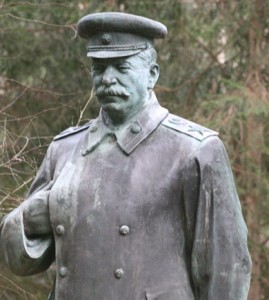
The differences in defining Stalin's legacy is a major bone of contention between many Eastern European countries and Russia. Photo by Nathan Greenhalgh.
VILNIUS — Assessing the rule of Joseph Stalin remains one of Eastern Europe’s most controversial subjects more than 60 years after the Soviet dictator’s death.
While Stalin is a hated figures in many of Europe’s former communist nations for his grand-scale human rights abuses, in Russia there are many who revere the man who defeated Hitler and modernized the Soviet Union’s economy.
In Russia the choice between honoring the murderous tyrant or not is closely watched by it’s neighbors and former Soviet satellite states, because an endorsement of Stalin implicitly approves the conversion to communism his regime forced upon them.
Over the past years the trend in Russia has been toward lionization of Stalin. Former president and current prime minister Vladimir Putin’s ordered the rewriting of state school history books that glossed over many of Stalin’s atrocities. A recent television poll voted Stalin the third-greatest Russian of all time, despite the fact that he was an ethnic Georgian.
So when Russian President Dmitry Medvedev harshly denounced the rehabilitation of Stalin’s legacy on a videoblog posted on the Kremlin website, the remarks reverberated around the world and Lithuania was no exception.
The Russian enigma — what does the statement portend?
Lithuania, along with the other two Baltic states Latvia and Estonia, consider their period under Soviet control to be an illegal occupation. But like its communist predecessor, the Russian Federation does not characterize the Baltic experience as such and still uses terms such as “sphere of influence” to describe the former Soviet republics. It’s not just the Russian government — a recent Pew Research Center poll shows that 47 percent of Russians believe their country should have an empire, up 10 percent from 1991.
Medvedev’s statement on Stalin did not touch upon those subjects, but regardless it is welcome here.
“This is a positive statement by President Medvedev,” Živilė Didzgalvienė, an adviser to the Lithuanian president, told Baltic Reports. “We cannot speculate on what the Russians will or will not do. We can just be happy with their statement or not, and we are happy with this statement.”
Fear of renewed Russian military aggression against the small Baltic state is widespread in Lithuania, but Vilnius University political science lecturer and political commentator Morta Vidūnaitė said this is irrational given Russia’s current foreign policy discourse.
“I think in Lithuania there’s too much of an irrational fear of Russians,” Vidūnaitė told Baltic Reports. “Russia’s just making a signal to the world community that ‘we are a quite well-behaving state.’ Maybe Russian leaders are sending a signal to other countries that ‘see, we are making some efforts.’ I think it’s also a change reflected by the election of Obama.”
The Lithuanian and Russian foreign ministers met last week to discuss increasing cooperation between the two countries. But that doesn’t mean the countries are seeing eye to eye on every issue.
Nerijus Malinkevičius, a political science director at Vilnius University specializing in Russian affairs, disagreed that Medvedev’s statement reflects a change in Russian foreign policy.
“It is surreal that when Medvedev spoke about these common sense things, everyone applauded,” Malinkevičius told Baltic Reports, noting that in most countries this would not be a newsworthy act. “I don’t see it in any way a turning point in Russian view of history or geopolitics of memory … too much was done already to legitimize this Soviet regime and historical attitudes to sphere of influence, I don’t see it as a big leap forward.”












